#sdg4
Text

How to achieve Equality? How to work for Peace?
Recently I met again with a dear friend I had not long seen, also due to the pandemic situation.
When I first got to know him he was still employed in an international and highly respected Swiss corporation as an engineer. And he was brilliant. So much so, that the somewhat more senior persons in his department blocked him in his professional development. Where was equality?
He then took a very bold decision, decided to build his own company and to develop the solution he had so long dreamt to bring to life with his employer.
Today, his organization employs more than 100 persons worldwide, counts customers on all continents and is highly profitable.
Defining Equality as a value and a target to be achieved within a firm is a starting point only. Equality must be lived by each team member in the Heart.
Equality is only reached when both female and male principles are equal in a person’s Heart and Body. And this path starts with the Self. Knowing Oneself. Knowing who we are truly are as Human Being. Knowing what it actually means to be a Human Being. Knowing where we come from. Knowing our Purpose and Be our Purpose. For the good of Oneself, our Community and Earth.
The prerequisite for Peace is Equality. Without Equality, no Peace. Each one of us can contribute to both. NOW.
This knowledge is revealed through experiencing, learning with our Body and Intuitive Mind. This is what we teach at Athena InsideOut Education.
#equality#education#awareness based educaiton#leadership#shamanism#peace#sdgs#sdg4#sdg5#sdg10#business education#inclusion#purpose#purpose driven#human innovation#human rights#humanity#compassion#respect#commitment#trust#performance#resilience#mental health
2 notes
·
View notes
Text
An Author Sparks Creativity Among Young Creators.

From immersing herself in the world of literature to crafting her own
stories, Chidera Okolie has been nurturing her creative interests since she was a child. The Nigerian lawyer and writer is the author of two novels, When Silence Becomes Too Loud (2014) and Not Forgiven (2017). Beyond her passion for writing, Okolie is actively encouraging young writers in Nigeria to fulfil their writing dreams through her Idios Creatives initiative, which she launched in 2018. This is her story. Chidera Okolie set up Idios Creatives, a platform for young people to explore and express their creativity. “Through the Idios Creatives project, I wanted to provide a platform for a new generation of writers to embrace their creative power. It is my way of contributing to the development of young peopleʼs writing and other creative skills,” Okolie explains. To capture the attention of young people across Nigeria, in 2018, Okolie created the Idios Prize for Flash Fiction and Poetry. Over 300 schoolchildren took part in the competition. “We visited schools across Nigeria, collecting short stories from young writers. Eventually, we had about 300 stories, which we narrowed down to the best 100 for publication. This has helped showcase the abundance of creative talent in Nigeria,” Okolie notes. In setting up Idios Creatives, her strongest hope is that “young people are encouraged to read more and to explore their own creativity.”
Advancing IP and creativity in Nigeria
The author is also a champion of intellectual property rights, highlighting their crucial importance in recognizing, rewarding and supporting creators for their work. “IP allows you to protect your creative work from exploitation, illegal reproduction and misuse. It also ensures the preservation of your economic rights, in other words, your ability to earn income from your work, and your moral rights, including the right to be credited as the creator, and the right
to protect the integrity of your work,” Okolie explains. While Nigeria has made progress in this regard, Okolie believes there is still more to be done to enhance the countryʼs copyright landscape. “Nigeria has long suffered from piracy, but the landscape is graduallyimproving. I strongly believe that IP rights play a critical role in emboldening artists to safeguard their work and use it for economic benefits. This becomes particularly significant when building a career
based on oneʼs creativity,” she says. Okolie started writing her first novel, When Silence Becomes Too Loud, in 2014, without any intention of sharing it outside her personal sphere. “It was purely a personal endeavor,” she notes. But her father insisted that she have
her book published. “I was hesitant to reveal myself so intimately and to allow others to delve into my innermost creative thoughts," she says. Despite her initial fears, Okolie started looking for a publisher and the bookʼs release, in 2014, exceeded all her expectations. “The book was widely acclaimed in my country and gained a lot of attention. It caught the eye of my countryʼs former president, who expressed his pride in associating with young people who strive to keep creativity alive in the country,” Okolie explains.

Her outstanding novel earned her three awards, including the 2016 Nigerian
Writers Award for Best Fiction Writer of the Year and a nomination for the African Achieverʼs award. Building on her success, Okolieʼs second publication, Not Forgiven, is a collection of short psychological thrillers and also won accolades, paving the way for her to receive Most Outstanding Fiction Writer of the Year in 2017.
In January 2019, Okolie was listed among the 100 Most Influential Young Nigerians by Avance Media.
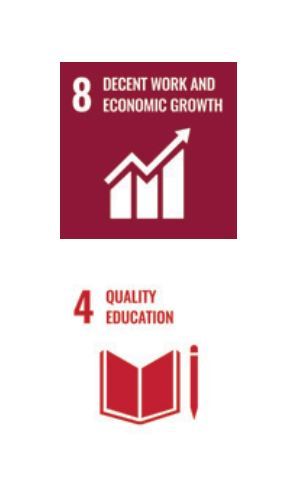
#Young Creators#26 april#world i.p. day#ip and the sdgs#imagination & creativity#literature sector#creative interests#nigeria#sdg4#sdg8#copyright#authors#ip at work
0 notes
Text
Innovate and Lead: Skills for Youth to Drive a Sustainable Future
The event offers an swith the aim of breaking traditional barriers to dialogue and collaboration.
Watch Innovate and Lead: Skills for Youth to Drive a Sustainable Future!

#decision makers#creators and entrepreneurs#barriers to Dialogue#barriers to Collaboration#young people#skills for youth#youth skills#sdg8#sdg4
0 notes
Text

Sustain the Challenge toys educate children about renewable energy and energy efficiency by fostering critical thinking, problem-solving, and creativity, which are essential skills for achieving the SDGs, especially the SDG 4 (Quality in Education). Hands-on learning experiences provided by Sustain the Challenge toys can inspire children to pursue careers in green businesses and STEM fields, which are essential for driving innovation and progress in areas such as renewable energy and energy efficiency.
0 notes
Text
31.1 Million teachers are needed in secondary education.

Secondary education has the greatest need for teachers. UNESCO data reveals a global decline of interest in pursuing a teaching career.
Read the insight on the recent Global Report on Teachers.
0 notes
Text
Emphasizing the importance of collective efforts in shaping the landscape of education statistics - 2024 Conference on education data and statistics.
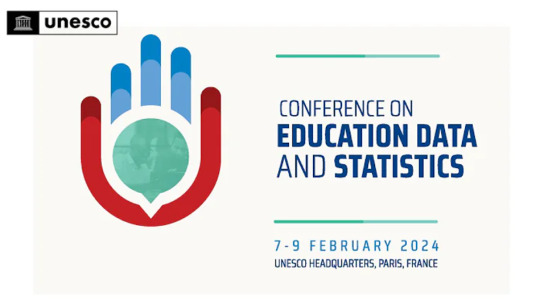
The UNESCO Conference on Education Data and Statistics is the first international event dedicated to establishing a collaborative platform for ongoing dialogue and mutual learning among education statisticians. This inaugural conference marks a significant milestone as the first-ever regular, open forum in the field of education statistics, where we delve into pressing questions regarding the present and future of internationally comparable data. Organized by the UNESCO Institute for Statistics (UIS), in collaboration with UNESCO's Education Sector and the Global Education Monitoring Report, this Conference aims to reaffirm the vital role of Member States as primary agents for coordinating education data and statistics. The conference also seeks to foster international statistical cooperation, emphasizing the importance of collective efforts in shaping the landscape of education statistics.
09:15 – 09:45 Opening of the Conference
09:45 – 10:30 Professor James Heckman, Henry Schultz Distinguished Service Professor of Economics & the Director of the Center for the Economics of Human Development, University of Chicago Winner of the Nobel Prize in Economics (2000)
10:30 – 11:30 High level panel
youtube
youtube
#SDG4#LearningNeverStops#Education#RightToEducation#UNESCO#UNESCO's Education Sector#UNESCO Institute for Statistics (UIS)#Global Education Monitoring Report#education statistics#education 2030#higher education#primary education#tertiary education
0 notes
Text
youtube
Empowering India for #2030Goals | Alka Lamba on Politics, SDGs, and Public Role
Explore Alka Lamba's insights on India's path to #2030KaBharat, analyzing the roles of political parties, opposition, and the public in achieving #SDGGoals #AlkaLamba #SDGs
#2030kabharat#sdg 2030#sdg2030#sdg 17#sdg goals#sdgs#sdg6#sustainable development#sdg3#sdg4#sdginindia sdggoals#sdginindia#sdggoals#climate change#climate action#lifebelowwater#lifeonland#zerohunger#nopoverty#qualityeducation#Youtube
0 notes
Text
Sustainable Development Goals (SDGs): Understanding Their Significance
The SDGs consist of 17 interconnected goals that cover a wide range of issues affecting humanity and the planet. These goals include eradicating poverty, ensuring quality education, promoting gender equality, and combating climate change, fostering sustainable cities and communities, and many more. The SDGs emphasize the need for collaboration among governments, businesses, civil society organizations, and individuals to achieve these ambitious targets.
0 notes
Text
USTP Trailblazers: Advancing Quality Education for a Sustainable Future

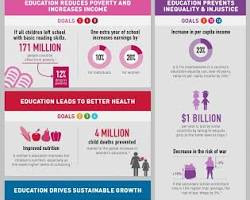
Sustainable Development Goal 4 (SDG 4) of the United Nations (UN) aims to ensure inclusive and equitable quality education and promote lifelong learning opportunities for all. Education is essential for achieving sustainable development, as it empowers people to make informed decisions about their lives and their communities, and to develop the knowledge and skills needed to address the complex challenges we face.
Why is education important for sustainability?
Education is important for sustainability because it empowers people to understand the complex challenges we face and to develop solutions to these challenges. Education also helps people to develop the critical thinking skills needed to evaluate information and make informed decisions. Additionally, education helps people to develop the empathy and compassion needed to build a more sustainable and equitable world.
USTP's Tagline and SDG 4
USTP's tagline, "Advancing a Sustainable Future," aligns perfectly with SDG 4. By providing students with access to quality education and teaching them about sustainability, USTP is preparing the next generation of leaders to build a more sustainable world.
USTP's Initiatives to Advance SDG 4
USTP has several initiatives in place to advance SDG 4, including:
Providing access to quality education for all students, regardless of their background or financial situation. USTP offers a variety of scholarships and financial aid programs to help students make their education affordable. The University also has several programs in place to support students from disadvantaged backgrounds, such as the USTP Special Program for the Arts, Sports, and Culture (SPASC) and the USTP Iskolar ng Bayan Program.
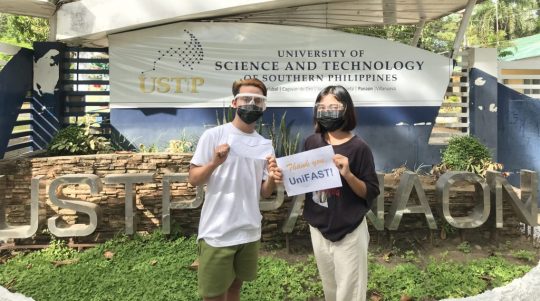
www.ustp.edu.ph
USTP students receiving scholarships
Offering programs that teach students about sustainability and how to promote sustainability in their personal and professional lives. USTP offers a variety of programs that teach students about sustainability, such as the Environmental Engineering program, the Sustainable Development Management program, and the Environmental Science program. USTP also integrates sustainability into its curriculum across all disciplines.

www.ustp.edu.ph
USTP students learning about sustainability in class
Giving students opportunities to get involved in sustainability initiatives on campus and in the community. USTP has several student organizations that are dedicated to sustainability, such as the USTP Sustainability Ambassadors and the USTP Green Campus Initiative. Students also have the opportunity to participate in sustainability research projects and internships.
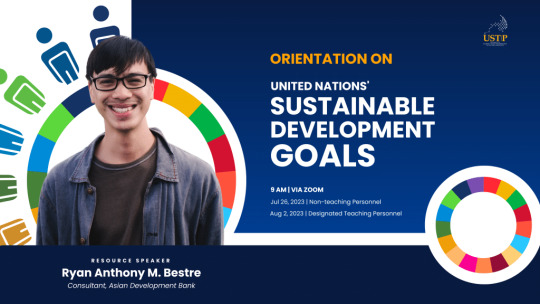
www.ustp.edu.ph
USTP students participating in a sustainability initiative
In addition to these initiatives, USTP is also working to advance SDG 4 by:
Partnering with other universities and organizations to develop and deliver sustainable education programs.
Researching sustainable education practices and sharing the findings with the wider community.
Advocating for government policies and programs that support sustainable education.
A research study by the UNESCO Chair in Education for Sustainable Development at Leuphana University in Germany found that education is essential for building resilience to climate change. The study found that people with higher levels of education are more likely to be aware of the risks of climate change, to take action to mitigate the impacts of climate change, and to adapt to the effects of climate change.
USTP is committed to advancing quality education for a sustainable future. USTP Trailblazers are making a difference in the world by developing innovative solutions to sustainability challenges. USTP is also working to advance SDG 4 by providing access to quality education, teaching students about sustainability, giving them opportunities to get involved in sustainability initiatives, and partnering with others to develop and deliver sustainable education programs.
What can you do to advance SDG 4 and USTP's tagline of "Advancing a Sustainable Future"?
Here are a few ideas:
Learn more about SDG 4 and how it relates to your personal and professional life.
Support USTP and other organizations that are working to advance education and sustainability.
Get involved in sustainability initiatives on your campus or in your community.
Encourage others to learn about and get involved in sustainability.
Together, we can make a difference.
0 notes
Text
Assessing the progress of all 193 United Nations Member States on the SDGs.

Sustainable Development Report 2023 ''Implementing the SDG Stimulus'' Read the full report
#SDG Stimulus#globalgoals#agenda 2030#sustainable development goals#sdg2#sdg8#sdg11#sdg4#sdg3#sdg6#sdg10#sdg12#sdg13#sdg14#sdg15#sdg16#sdg17#sdg5#sdg1#sdg9#SDG Indicator
0 notes
Text
Poverty is preventable.

Education.
Poor children typically go to rundown schools with inadequate facilities where they receive inadequate schooling. They are much less likely than wealthier children to graduate from high school or to go to college. Their lack of education in turn restricts them and their own children to poverty, once again helping to ensure a vicious cycle of continuing poverty across generations. As Chapter 10 “The Changing Family” explains, scholars debate whether the poor school performance of poor children stems more from the inadequacy of their schools and schooling versus their own poverty. Regardless of exactly why poor children are more likely to do poorly in school and to have low educational attainment, these educational problems are another major consequence of poverty .
#Poor children#lack of education#poverty across generations#educational attainment#educational problems#sdg4#consequence of poverty#undp
0 notes
Text
Catalyzing Transformative Change: Science, Academia and the Journey to 2030.
The objective of the side-event is to identify and promote concrete opportunities and partnerships for science and academia to accelerate transformations in high impact areas for implementing the 2030 Agenda for Sustainable Development.
Lead Facilitators:
UN DESA, in collaboration with:
Sustainable Development Solutions Network (SDSN)
International Science Council (ISC)
World Meteorological Organization (WMO)
United Nations Development Programme (UNDP)
Representatives of the Secretary-General's 10-Member-Group of High-level Representatives of Civil Society, Private Sector and Scientific Community to support the UN Technology Facilitation Mechanism
The 2030 Agenda for Sustainable Development stands as a ground-breaking global roadmap for addressing the most pressing challenges facing humanity. At the half-way point to 2030, science, technology and innovation hold enormous promise for enabling the kinds of transformations needed to accelerate progress on the Sustainable Development Goals (SDGs) –in energy systems, food systems, education, digital infrastructure, just economies, nature and the global commons and other crucial areas as indicated in the Special Edition of the SDG Report and the Global Sustainable Development Report. Addressing institutional and other barriers to knowledge and technology sharing and revolutionizing science, technology and innovation (STI) for sustainability can support a global enabling environment for the SDGs complementing financial reforms and a surge in SDG financing.
The objective of the event is to identify and promote concrete opportunities and partnerships for science and academia to accelerate transformations in high impact areas for implementing the 2030 Agenda for Sustainable Development. By bringing together policymakers, researchers, academics, and other stakeholders, the event will foster dialogue, share best practices and identify actionable strategies to advance the implementation of the SDGs. The event will also aim to help advance commitments in the SDG Summit Political Declaration for bridging the science, technology and innovation divides and supporting the responsible use of science, technology, and innovation as drivers of sustainable development.
---
To maximize the SDG Summit's impact, the Secretary General is convening an SDG Action Weekend, which will generate opportunities for stakeholders, UN entities, and Member States to convene inside the United Nations Headquarters and set out specific commitments and contributions to drive SDG transformation between now and 2030.
The SDG Action Weekend will consist of the SDG Mobilization Day on Saturday, 16 September, and the SDG Acceleration Day on Sunday, 17 September at UNHQ in New York.
The SDG Mobilization Day (16 September) will create an opportunity for stakeholders from all sectors to convene inside the United Nations Headquarters and mobilize towards an ambitious SDG Summit and UN General Assembly High-Level Week.
The SDG Acceleration Day (17 September) will be centred around the UN High-Impact Initiatives
The SDG Summit on 18-19 September will mark the mid point of the SDGs. It must secure the breakthroughs and momentum needed to change course and achieve the SDGs by 2030. To maximize the Summit's impact, the Secretary General is convening an SDG Action Weekend, which will generate opportunities for stakeholders, UN entities, and Member States to convene inside the United Nations Headquarters and set out specific commitments and contributions to drive SDG transformation between now and 2030.
#revolutionizing science#technology and innovation (STI)#knowledge and technology sharing#Sustainable Development Solutions Network (SDSN)#International Science Council (ISC)#United Nations Development Programme (UNDP)#World Meteorological Organization (WMO)#Partnership for science#science#academia#sdg4#stakeholders#SDG Action#agenda 2030#responsible use#innovation#plenary sessions
0 notes
Text
Can Access to Published Research Help Local Science and Innovation?
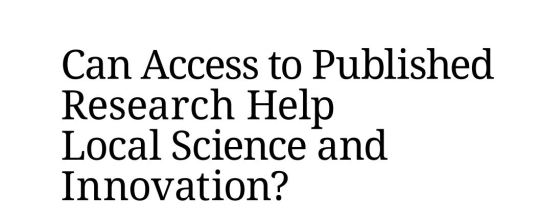
Low-cost access to information can drive research and clinical trials in developing economies and contribute to SDGs. But different regions are affected in different ways. So how can low-performing institutions catch up?
So far, the public debate on access to medicine, neglected diseases, and patent-protected technology has underplayed the potential of access to information for economic development. Similarly, earlier research has revealed a startling gap between lower- and higher-income countries in terms of access to knowledge, with over half of medical institutions having had no subscriptions to academic literature in lower-income countries.

Several UN agencies and major academic publishers launched the Research
For Life (R4L) initiative to fill this gap. The World Health Organization (WHO) runs Health InterNetwork Access to Research Initiative (Hinari), one of fiveprograms under the R4L umbrella. It provides free or low-cost access to academic literature to at least 270,000 researchers in over 100 developing economies. This is for this WHO-led program alone. The entire initiative includes more than 21,000 peer-reviewed journals, 69,000 e-books and 115 data and other sources. Focusing on Hinari, a new WIPO research paper carried out empirical analysis of millions of data points to understand the strengths and weaknesses of the program. It is the first study to link access to scientific publications in developing countries to welfare along the science-to innovation pipeline. The report shows a local increase in health science publications of up to 75% after joining Hinari. Likewise, involvement in international clinical trials grew
by over 20%, suggesting that research and innovation in local institutions improved. Screening over 36 million scientific papers in PubMed, a repository of health science, the study found more than 167,000 papers coauthored by local researchers in developing economies, which cited clinical trials conducted worldwide over 30 years.
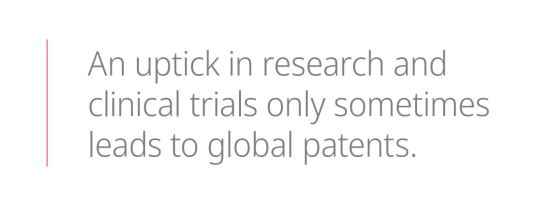
However, this uptick in science publishing and clinical trials only partially translated into global patents and inventions. The study attributes this to developing countries often lacking infrastructure and funding to transfer new findings into patented technologies. This gap reveals the remaining challenges in developing innovation and IP systems. Moreover, the study also finds that local context matters. Institutions in specific regions and those that already had a high research performance benefited most from the Hinari program. This also means that it is harder for others to catch up, despite better access to information.
Access to global knowledge counts on the ground
Empowering local researchers by providing access to information is
essential to their work. Researchers tend to target diseases that affect the local population and may be overlooked by researchers abroad. Enabling such access may help innovation in neglected diseases, mainly by connecting local teams to the global knowledge base. Aside from increased scientific activity, R4L also reports direct effects from Hinari regarding medical practice and patient care. The initiative quotes Dr. Nguyen Duc Chinh from Viet Duc Hospital, Hanoi, Viet Nam: “Good research, in short, leads to better patient care.” The doctor relied heavily on Hinari for his PhD on intestinal TB and surgical treatment. TB is prevalent in Viet Nam, but there is a relative lack of information on intestinal TB. “With the information and knowledge we obtain,” he says, “we feel more confident in practicing and implementing respected medical expertise from around the world.” Dr. Sami Hyacinthe Kambire at Kamboinsé Research Station, Ouagadougou, Burkina Faso, also found his research progressing faster and wrote grantwinning funding proposals thanks to Hinari. Before his institution adopted R4L, Dr. Kambire often devoted considerable time to research already
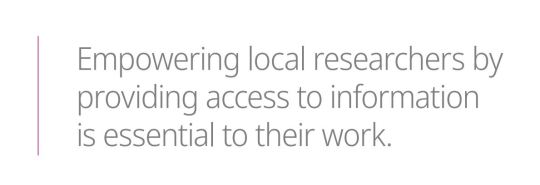
performed elsewhere. The initiative helped reduce these duplicative
research efforts in global health sciences and increase the quality of local teaching and education.
Access to information affects institutions differently
Despite the impacts, the study also found that the program effects differed for different parts of the world. Research institutions in the Carribean, Central Asia, Europe and Latin America benefited the most in generating new scientific knowledge. On average, their academic paper output increased by 80–100%. Regarding clinical trials, program participation is most impactful for East Asia, the Pacific, the Middle East and North Africa. Trial activity rose by up to 35% at institutions in these regions. That does not mean other regions did not gain from the program, but the impact has been less pronounced.
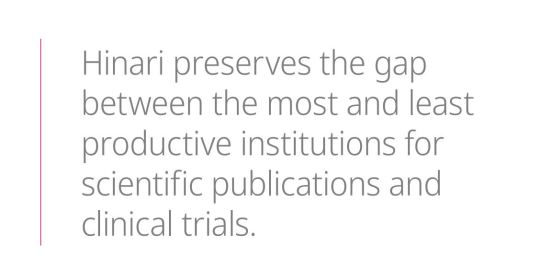
However, there are also institutional differences. Notably, the study
authors wanted to avoid comparing apples to oranges, because high- and low-performing research institutions differ. The high performers might be more likely to adopt the Hinari program in the first place. Seeing more publications might also be an outcome of the institutionsʼ selection into the program rather than an outcome of the program and better access to knowledge on the ground. To reveal the causal effects rather than mere correlations, the study compares different fields. This means health sciences supported by the program are matched against other research fields not supported by Hinari but conducted at the same institution.
How to make the most of access to information
Having ruled out the factors described above, the report suggests that program management could improve in two ways. First, it shows that already productive institutions benefit more from Hinari. For example, research institutions that have previously published academic papers see an average 60–70% increase in their publications after joining. This increase is only around 40% for institutions that rarely published scientific works previously. This suggests that Hinari preserves the gap between the most and least productive institutions for scientific publications and clinical trials. Under these conditions, the least productive institutions are, all else being equal, less likely to catch up. Still, the study ultimately supports the view that the Hinari program and the R4L initiative contribute to achieving the SDGs. They help boost research
and innovation capacity in developing economies and improve health
services (SDG 3) and education quality (SDG 4) at local institutions. They also aim to build industry, innovation and infrastructure, thus encouraging decent economic growth (SDGs 8 and 9).
The R4L initiative is also an excellent example of how private–public
initiatives can make a difference. It joins private sector stakeholders from
the global publishing industry and research institutions in the UN member states in a win–win situation. For research institutions, the initiative provides a practical solution. Their libraries and labs often need to be better resourced, and R4L improves access to information for students and researchers. It is also a smart way for industry stakeholders to show their corporate social responsibility and enhance their social impact in developing economies. It could also help grow local demand and the customer base in the long term.
Moreover, easing access to published research through initiatives like Hinari and WIPOʼs Access to Research for Development and Innovation (ARDI) program can significantly affect research output and contribute to desired social and economic outcomes laid out in the SDGs. UN agencies like the WHO and WIPO have been vital matchmakers. However, addressing existing gaps through schemes such as WIPOʼs Technology and Innovation Support Centers (TISCs) may help build local infrastructure and contribute to a vibrant IP and innovation system. In conclusion, the reportʼs findings on success and remaining challenges may inform stakeholdersʼ decisions to renew or change their commitment to R4L beyond 2025.

#patent-protected technology#Published Research#Local Science and Innovation#research and clinical trials#patented technologies#world i.p. day#26 april#R4L initiative#sdg3#sdg4#sdg8#sdg9#Technology and Innovation Support Centers (TISCs)#Access to Research for Development and Innovation (ARDI) program#ip and the sdgs
0 notes
Text
(Part 1) First Interuniversity Conference on Youth, Education and Research.
The conference format includes both conventional presentations and a discussion panel centered around the theme of education and youth. This panel comprises representatives from a wide range of countries and organizations. Its primary objective is to facilitate open dialogues on critical conference topics, summarizing perspectives expressed in the conventional presentations, and suggesting directions for future research and policy development.
The conference aims to explore the nexus between youth, education, and research. It is co-chaired by Ambassador and Permanent Representative, H.E. M.r Karlito Nunes of the Democratic Republic of Timor Leste, with Ambassador and Permanent Observer, H.E. M.r Daniel del Valle Blanco and Ambassador and Deputy Permanent Observer, HE. Dr. Otto von Feigenblatt of the International Youth Organization to the United Nations.
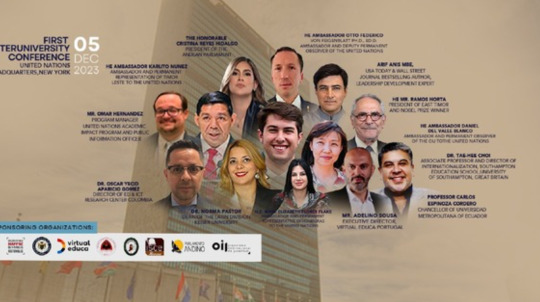
#Youth-Education-Research NEXUS#panel discussion#education sector#education professionals#academics#primary education#higher education#secondary education#Education 2030#Research#sdg4#education and youth#Conferences
0 notes
Text
Towards a Rights-centred Gender Transformative Economy, Including a New International Financial Architecture.
This side-event will feature a diverse and intersectional group of thought leaders and practitioners, including feminist & women's rights organizations, LGBTI+ organizations, United Nations entities and Member States & other relevant stakeholders and will explore the gendered implications of the current financial architecture and discuss how the reforms proposed by civil society, Member States, the World Bank Evolution Roadmap and the Secretary-General can be designed and expanded to accelerate progress toward the SDGs.
Lead Facilitators:
Women's Major Group, with the support of UN Women.
Established during World War II, the institutions of the international financial architecture are no longer fit to address the challenges of our time. In their current structure and operational models, they have amplified structural inequalities, jeopardized social, economic and environmental rights and led to the fragmentation of international financial and economic relations, hampering the implementation of the SDGs. Conditionalities imposed by international financial institutions and austerity policies, in particular, have constrained fiscal space and concentrated wealth at the top.
Participants will discuss and give concrete suggestions for how the resources unlocked through debt relief and these reforms should support gender-responsive fiscal and financial policies, including investments in social protection, care, health and education, and reductions in occupational, wage and other gender gaps. The event will encourage commitment by Member States and financial institutions towards an economic model for gender transformative results at all levels. ---
To maximize the SDG Summit's impact, the Secretary General is convening an SDG Action Weekend, which will generate opportunities for stakeholders, UN entities, and Member States to convene inside the United Nations Headquarters and set out specific commitments and contributions to drive SDG transformation between now and 2030.
The SDG Action Weekend will consist of the SDG Mobilization Day on Saturday, 16 September, and the SDG Acceleration Day on Sunday, 17 September at UNHQ in New York.
The SDG Mobilization Day (16 September) will create an opportunity for stakeholders from all sectors to convene inside the United Nations Headquarters and mobilize towards an ambitious SDG Summit and UN General Assembly High-Level Week.
The SDG Acceleration Day (17 September) will be centred around the UN High-Impact Initiatives
The SDG Summit on 18-19 September will mark the mid point of the SDGs. It must secure the breakthroughs and momentum needed to change course and achieve the SDGs by 2030. To maximize the Summit's impact, the Secretary General is convening an SDG Action Weekend, which will generate opportunities for stakeholders, UN entities, and Member States to convene inside the United Nations Headquarters and set out specific commitments and contributions to drive SDG transformation between now and 2030.
#gender equality#Women's Major Group#agenda 2030#sdg5#SDG Action#structural inequalities#un women#financial architecture#sdg1#social protection#sdg3#sdg4#stakeholders#Global goals#plenary sessions#debt relief#Economy#sdg8
0 notes
Text
Opening plenary (SDG Action Weekend, Mobilization Day).
As the opening to SDG Action Weekend, the opening plenary of the Saturday proceedings will emphasize the urgency of this moment. Halfway to the 2030 Deadline, we are not halfway there –many goals remain off-track and global economic, geopolitical, and environmental headwinds threaten progress in other areas.
The 2030 Agenda is a promise, not a guarantee, and humanity is in the hotseat. In the face of these challenges, participants will be reminded by speakers that transformation, at scale, is possible. We have the right tools and capabilities but now we need everyone, individually and collectively, to channel these resources more efficiently to deliver on the SDGs. This session will feature a keynote speech from a former Head of State, providing a sober reality check of the moment and emphasizing the possibility for us to achieve our promise. To close, an empowering performance from Yemi Aladewill set an uplifting tone as stakeholders head into the programming of SDG Mobilization Day.
---
To maximize the SDG Summit's impact, the Secretary General is convening an SDG Action Weekend, which will generate opportunities for stakeholders, UN entities, and Member States to convene inside the United Nations Headquarters and set out specific commitments and contributions to drive SDG transformation between now and 2030.
The SDG Action Weekend will consist of the SDG Mobilization Day on Saturday, 16 September, and the SDG Acceleration Day on Sunday, 17 September at UNHQ in New York.
The SDG Mobilization Day (16 September) will create an opportunity for stakeholders from all sectors to convene inside the United Nations Headquarters and mobilize towards an ambitious SDG Summit and UN General Assembly High-Level Week.
The SDG Acceleration Day (17 September) will be centred around the UN High-Impact Initiatives
The SDG Summit on 18-19 September will mark the mid point of the SDGs. It must secure the breakthroughs and momentum needed to change course and achieve the SDGs by 2030. To maximize the Summit's impact, the Secretary General is convening an SDG Action Weekend, which will generate opportunities for stakeholders, UN entities, and Member States to convene inside the United Nations Headquarters and set out specific commitments and contributions to drive SDG transformation between now and 2030.
#sdg1#sdg2#sdg3#sdg4#sdg5#sdg6#sdg7#sdg8#sdg9#sdg10#sdg11#sdg12#sdg13#sdg14#sdg15#sdg16#sdg17#globalgoals#sustainable development goals#stakeholders#sdg action#opening plenary#plenary session
0 notes